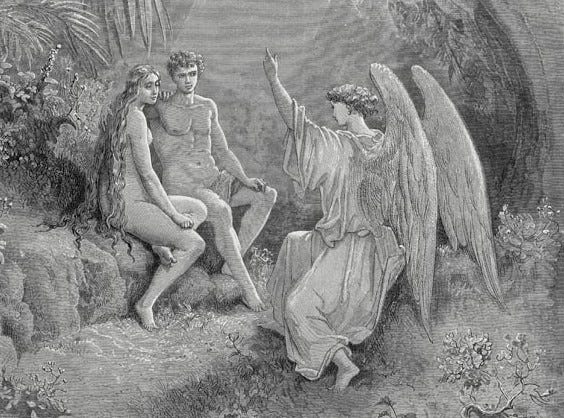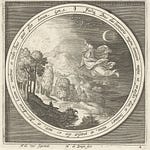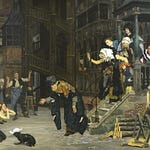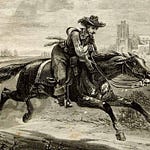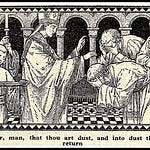In celebration of the two-year anniversary of Word & Song we are offering through July a special rate on paid, gift, and upgraded subscriptions.
Join us for Poetry Aloud (Friday podcasts) this summer, when Dr. Esolen will continue to read Huckleberry Finn, chapter by chapter, in its entirety.
On Monday, I had occasion to bring up Augustus Caesar, because August was our Word of the Week, and the Roman Senate named the month after him, just as they’d named July after his great-uncle and adoptive father, Julius Caesar. You’d think that flattery couldn’t get any more obvious than that, but you’d be wrong. Out in the provinces, people began to practice the cult of Roma et Augustus, worshiping Rome and Augustus as if they were gods. When Augustus heard about it, he was shocked, shocked! Why, he said, I’m only a mortal man like everybody else. So they didn’t set up such a temple in Rome, but Augustus didn’t go out of his way to make the provincials stop doing that. Rather, he found it quite convenient for his purposes. He even had coins stamped with his face on them — that was an innovation for the Romans, to have a living commander, the meaning of “IMPERATOR” or emperor, gracing a coin with his majesty. By the way, before 1909, the centennial of Abraham Lincoln’s birth, we in the United States never had any human portrait on our coinage but that of Miss Liberty (or sometimes a masculine Liberty, represented by an American Indian chief). Now Miss Liberty is gone, and we’ve got political figures on everything. I miss the Miss.
Augustus was, as I’ve said, a far-seeing and most capable ruler. But he did want to overawe his subjects, even while he pretended to be jus’ folks with the senatorial class in Rome. Such are human beings when they sit themselves upon royal thrones. But God, who made man as the chief governor of all creation, is not like that. The true King wants all his subjects to be royal. He is given greater honor, not less, the greater they become, and they grow toward him by heeding his word, which is what it means to obey. Jewish believers understand this. They don’t look upon the Law as a set of restrictions. They look upon it as a great gift and an invitation, to share in the mind and the power of God.
The poet Milton understood that Adam was to be king of the world — but so had all the Christian poets, artists, and thinkers. Now, I don’t want you to say here, “Not Milton, oh no — that’s too tough for me!” Be patient, my friends! All his sentences make sense, and if you listen, if you let the mighty music of his verse resound in your mind and heart, you’ll find that it too is a great gift.
Here is the scene. The archangel Raphael, friendly and sociable, has been bidden by the Father to go to earth to warn Adam and Eve about the coming of their mortal foe, Satan. Raphael’s job is to make them wise as to who Satan is, what he used to be before he fell, and what illogic he used to persuade so many to follow him in his ambition. For Satan plays the democrat and liberator, but what he really wants is “to set himself in glory above his peers,” seeking the very throne of God. Adam and Eve have greeted Raphael, as a king and queen would greet the emissary of their own King, with solemnity, warmth, and a submissiveness that only heightens their stature. Raphael recounts to Adam the war in Heaven and the rout of Satan and his hosts by the Son of God, and then he describes, day by day, God’s creation of our world, from the stars and the heavens above us to all the creatures upon earth, the great and the small, all of them wonderfully made. That brings us to the summit of the sixth day and the creation of Man.
We were meant to be royal: and we still have a tarnished royalty about us, and in this life, by the grace of God, we work our way toward what Adam was, and beyond what Adam was, because man redeemed is a greater work of God than was the innocent first king in the garden. Here, then, are Milton’s verses, as spoken by Raphael, on the making of Adam.
There wanted yet the Master work, the end Of all yet done; a Creature who not prone And brute as other Creatures, but endued With Sanctity of Reason, might erect His Stature, and upright with Front serene Govern the rest, self-knowing, and from thence Magnanimous to correspond with Heaven, But grateful to acknowledge whence his good Descends, thither with heart and voice and eyes Directed in Devotion, to adore And worship God Supreme who made him chief Of all his works: therefore the Omnipotent Eternal Father (for where is not he Present?) thus to his Son audibly spake. Let us make now Man in our image, Man In our similitude, and let them rule Over the Fish and Fowl of Sea and Air, Beast of the Field, and over all the Earth, And every creeping thing that creeps on ground. This said, he formed thee, Adam, thee O Man Dust of the ground, and in thy nostrils breathed The breath of Life; in his own Image he Created thee, in the Image of God Express, and thou becam'st a living Soul.
Listen to this episode with a 7-day free trial
Subscribe to Word & Song by Anthony Esolen to listen to this post and get 7 days of free access to the full post archives.




